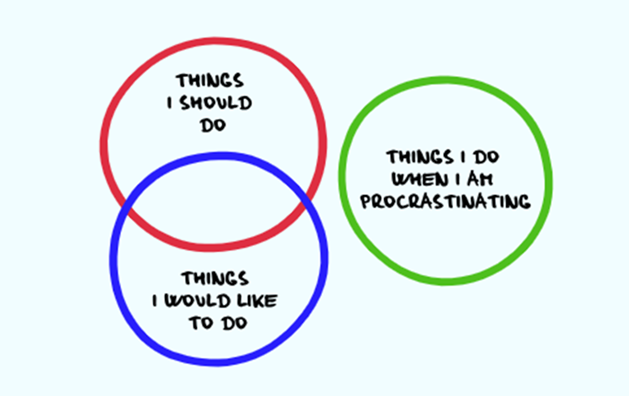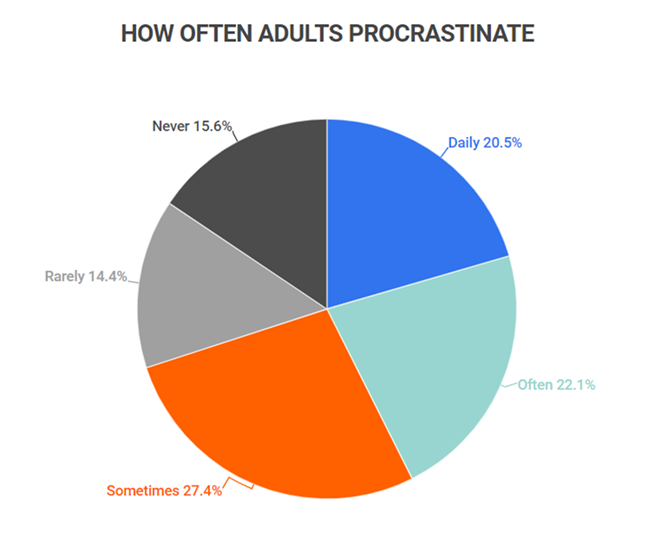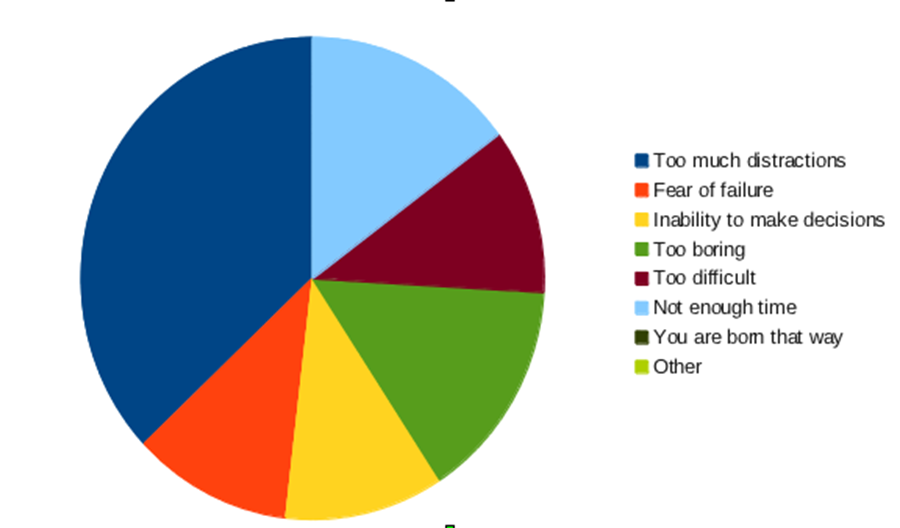Procrastination: The Silent Career Killer and How to Defeat It

Are you tired of feeling like you're constantly racing against the clock, putting off important tasks until the last minute, and drowning in a sea of unfinished to-do lists? Well, you're not alone! Procrastination is the sneaky little gremlin that loves to sabotage our productivity and steal our precious time. But fear not, because today we're diving headfirst into the world of procrastination – exploring the why's, the feelings, and most importantly, strategies to kick it to the curb!
What is procrastination?
Procrastination is trouble persuading yourself to do the things you should do or would like to do. When you procrastinate, instead of working on important, meaningful tasks, you find yourself performing trivial activities.

Procrastination is NOT laziness.
Procrastinators often put off doing things, leave them to the very last moment or sometimes even spend their time staring at the wall. However, be careful, procrastination is not a synonym for laziness.
Lazy people simply don’t do anything and are just fine with it. Procrastinators, on the other hand, have the desire to actually do something but can’t force themselves to start.
The Feelings that Come with Procrastination
Now, let's get real about the feelings that come with procrastination. It's not all rainbows and sunshine, folks – procrastination can leave us feeling stressed, anxious, and downright frustrated.
Stress City: Procrastination and stress go together like peanut butter and jelly (not in a good way!). Putting off tasks until the last-minute leads to a mad dash to the finish line, leaving us frazzled, anxious, and questioning all our life choices.
Anxiety Avenue: Nothing fuels anxiety quite like a looming deadline. The longer we procrastinate, the more that nagging sense of dread creeps in, whispering sweet nothings about impending doom and catastrophe.
Frustrationville: Procrastination is like that annoying friend who always shows up uninvited and overstays their welcome. It leaves us feeling frustrated and defeated, wondering why we can't just get our act together and tackle our tasks like we truly want to.
And the negative impacts of procrastination
While procrastination may offer temporary relief or spurts of productivity, its long-term impacts on career success and satisfaction are generally negative. Procrastination can lead to missed deadlines, which can have serious consequences in a professional setting. Missed deadlines can damage professional relationships, harm reputation, and impact career advancement opportunities.
Procrastination may result in rushed or subpar work quality. When tasks are left until the last minute, there is less time for thorough planning, research, and review, leading to errors, oversights, and lower-quality outcomes.
Procrastination often leads to increased stress and anxiety as deadlines approach. The pressure of impending deadlines can cause significant stress and negatively impact mental health, well-being, and job satisfaction.
Persistent procrastination can hinder career growth and advancement. Continuously missing deadlines, producing low-quality work, or failing to meet expectations can impede progress and limit opportunities for professional development and advancement.
So, knowing the negative impact and experiencing the unpleasant feelings, why do we procrastinate?
Why do people procrastinate?
If you procrastinate, you are not alone. Based on a 2023 study conducted by Procrastination.com (yep – it’s a real company) 20% of adults procrastinate daily.

People procrastinate for various reasons, including psychological, emotional, and situational factors. Some common reasons for procrastination include:
Fear of Failure: The fear of not meeting expectations or failing at a task can lead to procrastination. Individuals may delay starting a task because they worry about making mistakes or being judged by others.
Perfectionism: Perfectionists may procrastinate because they feel overwhelmed by the pressure to produce flawless work. They may delay starting a task until they feel they can achieve perfection, which can result in unnecessary delays.
Lack of Motivation: Procrastination can occur when individuals lack motivation or interest in the task at hand. Without a clear sense of purpose or enthusiasm for the task, they may struggle to initiate action.
Poor Time Management Skills: Individuals who struggle with time management may procrastinate due to difficulty prioritizing tasks, setting realistic goals, or managing distractions. They may underestimate the time needed to complete tasks, leading to last-minute rushes.
Avoid Discomfort: Procrastination can be a coping mechanism for avoiding uncomfortable emotions such as stress, anxiety, or even boredom. The task may be too boring. The task may be too difficult. Individuals may delay tasks that evoke negative emotions in favor of short-term relief.
Overwhelm: Feeling overwhelmed by the sheer volume or complexity of tasks can lead to procrastination. When faced with a daunting workload, individuals may procrastinate to cope with feelings of stress or helplessness.
Lack of Structure or Accountability: Without clear deadlines, structure, or external accountability, individuals may struggle to initiate action and procrastinate instead.
Distractions / Impulsivity: Some people procrastinate due to impulsivity or a preference for immediate gratification. They may prioritize short-term pleasure or leisure activities over long-term goals or responsibilities.

The reasons for procrastination can vary from person to person and may be influenced by individual differences, personality traits, and environmental factors. Understanding the underlying reasons for procrastination can help you develop strategies to overcome this behavior and improve productivity.
Do procrastinators drive you crazy? [Do you drive others crazy?]
When dealing with a procrastinator, people may experience a range of emotions and reactions, including frustration, annoyance, disappointment, and concern.
Dealing with a procrastinator can be frustrating, especially if their delays or lack of action impact shared responsibilities or deadlines. It can feel like procrastination is causing unnecessary stress or complications to others or to a project.
A procrastinator can be annoying, as their actions may lead to repeated delays or last-minute rushes, which can be annoying for those who rely on the procrastinator to complete tasks or contribute to projects. This annoyance may stem from feeling like the procrastinator is not taking their responsibilities seriously.
When a procrastinator fails to follow through on their commitments or meet expectations, others may feel disappointed, particularly if they had high hopes for the procrastinator's contributions. This disappointment may be compounded if the procrastination leads to negative consequences for the individual or the team.
Procrastination can be a sign of underlying issues such as poor time management skills, perfectionism, or avoidance behavior. Those interacting with a procrastinator may feel concerned about their well-being, productivity, or ability to manage their responsibilities effectively.
Overall, the feelings that individuals experience when dealing with a procrastinator can vary depending on the circumstances, the nature of the relationship, and the impact of the procrastination on their own lives and responsibilities. While frustration and annoyance are common reactions, it's important for individuals to recognize that overcoming procrastination can be a complex and challenging process. And if you are the procrastinator, be aware of the stress you may be causing others.
The benefits of procrastination.
It’s not all bad news. While procrastination is generally viewed as a negative behavior, there are a few potential benefits or advantages that some individuals may experience.
Increased Creativity: Procrastination can sometimes lead to bursts of creativity and innovation. When you are faced with looming deadlines, you may be motivated to think outside the box and come up with unique solutions to complete tasks efficiently.
Enhanced / Hyper Focus: For some people (me, for example), the pressure of impending deadlines can sharpen focus and concentration. Procrastinating until the last minute may help you eliminate distractions and prioritize tasks more effectively.
Improved Time Management Skills: Procrastination can serve as a learning experience, prompting you to reflect on your time management habits and develop strategies to avoid future procrastination.
Opportunity for Reflection: Procrastination can offer individuals time to reflect on tasks or decisions before taking action. This period of delay may allow you to have deeper thought and consideration, leading to more informed choices.
It's important to note that while these potential benefits may apply to some individuals in certain situations, procrastination generally has negative consequences for productivity, well-being, and overall success. It's important to recognize procrastination as a behavior that should be minimized or avoided whenever possible.
How do you combat procrastination?
Overcoming procrastination requires a combination of self-awareness, mindset shifts, and practical strategies.
If you struggle with procrastination, certain time management tools may not be as effective in addressing your challenges. Here are a few examples of tools that may NOT be ideal for procrastinators:
Traditional To-Do Lists: While to-do lists can be helpful for organizing tasks and priorities, they may not address the underlying issues that contribute to procrastination. Procrastinators may find themselves overwhelmed by lengthy to-do lists or may procrastinate on tasks even after they are written down.
Calendar Blocking: Calendar blocking involves scheduling specific time blocks for tasks and activities throughout the day. While this approach can be effective for some individuals, procrastinators may struggle to adhere to a rigid schedule and may procrastinate on tasks that are assigned to specific time slots.
Goal Setting Techniques: Goal setting techniques such as SMART goals (Specific, Measurable, Achievable, Relevant, Time-bound) or the Eisenhower Matrix can be valuable for setting and prioritizing objectives. However, procrastinators may struggle to follow through on their goals or may procrastinate on tasks that are important but not urgent. When individuals procrastinate on multiple tasks, they may become inundated with urgent and important tasks, leading to decision fatigue and decreased productivity.
Productivity Apps: Productivity apps offer a wide range of features, including task management, time tracking, and goal setting. While these apps can provide useful tools for organization and productivity, procrastinators may find themselves spending more time exploring the features of the app than actually completing tasks. (yep, that’s me too!)
Time management tools for procrastinators
Break tasks into smaller, more manageable steps. This makes the task feel less overwhelming and easier to approach.
Set clear, achievable goals with specific deadlines. Having a defined endpoint increases your motivation and provides a sense of urgency to get started. (Resource: Try the 12 Week Year process - https://12weekyear.com/)
Develop a structured schedule or to-do list that outlines tasks and deadlines. Pull from your master to do list, and for a short, prioritized list to accomplish on a given day. Stick to the list.
Implement time management techniques such as the Pomodoro Technique (work in short, focused intervals with breaks) or time blocking for the day (allocating specific blocks of time for different tasks).
Cultivate self-discipline by developing habits and routines that support productivity. This may include setting boundaries, limiting distractions, and practicing self-control.
Identify the underlying reasons for procrastination, such as fear of failure, perfectionism, or lack of motivation. Addressing these underlying issues can help overcome procrastination more effectively.
Shift your mindset from focusing on perfection to embracing progress. Accept that not everything will be perfect and that it's okay to make mistakes along the way.
Share your goals and deadlines with others who can hold you accountable. This could be a friend, family member, or colleague who can provide support and encouragement.
Practice self-compassion: Be kind to yourself and practice self-compassion when facing setbacks or challenges. Acknowledge your efforts and progress and forgive yourself for any slip-ups along the way.
Reward yourself! Create a system of rewards for completing tasks or reaching milestones. This reinforces positive behavior and provides motivation to continue making progress.
Use the “5 Second Rule” by Mel Robbins. Mel Robbins is a motivational speaker, author, and life coach known for her work on personal development and overcoming self-imposed limitations. One of Mel Robbins' most well-known concepts is the "5 Second Rule," which involves counting down from five and then taking immediate action before your mind has a chance to come up with excuses or reasons to procrastinate.
By implementing these strategies and techniques, you can gradually overcome procrastination and increase productivity in your personal and professional lives. It's important to be patient and persistent, as overcoming procrastination is a journey that takes time and effort.

Words of encouragement.
While procrastination is often seen as a hindrance, there are a couple of "superpowers" that procrastinators may possess. In addition to being creative under pressure, as a procrastinator, you typically have high adaptability. Procrastinators are accustomed to working under the constraint of time, which can make us more adaptable to changing circumstances or unexpected challenges. We are skilled at quickly shifting priorities, making decisions on the fly, and finding efficient solutions to problems, especially when time is of the essence.
To all the incredible working women out there who sometimes find themselves battling procrastination, you are not alone. Procrastination is a common challenge that many of us face, especially when juggling multiple responsibilities and competing priorities. Remember, it's okay and normal to struggle sometimes. What's important is how you respond to those challenges.
Keep moving forward, one step at a time. Embrace progress over perfection and remember that every and any effort you make brings you closer to your goals. Stay focused, stay determined, and never underestimate the power of your resilience.
A Coach is Your Partner in Greatness
Let’s face it -- sharing your desire for help with procrastination with coworkers is not always in your best interest. Sometimes you need an objective person – a coach who can encourage and accompany you on your career growth journey.
A coach will provide needed objectivity and help you brainstorm about different ways to view a situation or how to handle it. These fresh new insights can be a game-changer in your progress.
You’ll need to do ‘the work’ – as the coach won’t give you the answers, and they will motivate you on your journey forward. A coach is instrumental in coaching you to get to the endgame, whatever is your goal.
Ready to invest in your future by partnering with a coach?
Schedule a FREE 30-minute discovery call that allows you to explore further.
Find your way forward, reach your goals, and get something done with a coach in your corner!